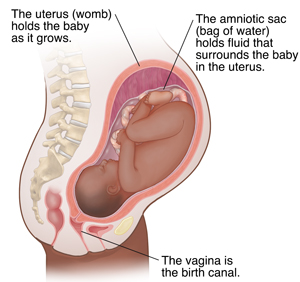Understanding Group B Strep in Newborns: Risks, Infection, and Symptoms
Group B strep ( streptococcus), also known as GBS, is a common type of bacteria. It can grow in the stomach, intestines, vagina, rectum, or urinary tract. It most often does not cause harm in adults. But in rare cases, if you're pregnant and have group B strep, it can infect the baby during birth. This can cause serious illness in the newborn. But treatment during labor reduces the risk of the baby becoming infected. And if a newborn gets group B strep, the infection can be treated.

Facts about group B strep
Learning more about group B strep can help you understand how testing and treatment can help. Here are some basic facts about group B strep (GBS):
-
It's not a sexually transmitted infection.
-
It's not the same as strep throat. (That is caused by group A strep.)
-
It often has no symptoms and does not make people feel sick. It may cause no problems in adults.
-
The Centers for Disease Control and Prevention recommends screening for GBS for all pregnant patients between 35 and 37 weeks in each pregnancy.
-
Test results can be misleading. They may be negative one week and positive the next week. So, a positive test result at any time during the pregnancy will need treatment during labor.
-
In the United States, there’s no evidence that GBS bacteria spread through food, water, or anything that people might have come into contact with.
-
GBS can spread to the baby during vaginal delivery. It can't be passed during cesarean (surgical) birth.
-
When a person is treated during labor and delivery, the baby rarely becomes infected.
-
Certain things during pregnancy increase the risk of a baby becoming infected.
Possible effects on your baby
Group B strep can infect the blood (sepsis). It can also cause infection of the baby’s lungs (pneumonia) and inflammation of the brain or spinal cord (meningitis). Long-term effects can include blindness, deafness, mental retardation, or cerebral palsy. And in rare cases, infection causes death. In the United States, GBS is the most common infectious cause of illness and death in newborns. Infection is most often found soon after the baby is born.
How your baby may become infected
Group B strep often lives in the vagina or rectum. If the amniotic sac breaks early, bacteria from the vagina can travel to the uterus, reaching the baby. Or, while passing through the birth canal, the baby can come in contact with the bacteria. In rare cases, group B strep can be passed to the baby after delivery. Early-onset GBS infections occur within the first week of life, whereas late-onset infection occurs beyond the first week of life. The source of late-onset GBS is not well understood. But some experts believe that it happens if the baby is exposed to GBS in the home, from the mother or others in the household.
Delayed late-onset Group B strep usually occurs after age 3 months. Most cases occur in premature and very low birth-weight infants or in those with HIV infection or immunodeficiency.
What increases the risk?
Certain things increase the chance that a baby will be infected. They include:
-
Breaking or leaking of the amniotic sac before 37 weeks of pregnancy.
-
Preterm labor before 37 weeks of pregnancy.
-
Breaking of the amniotic sac for more than 18 hours before labor starts.
-
Maternal fever during labor (greater than 100.4 F or 38 C).
-
A urinary tract infection with group B strep at any point in the pregnancy.
-
Maternal GBS found with positive GBS vaginal or rectal screening culture.
-
Having a previous baby born with a GBS infection.
Online Medical Reviewer:
Daphne Pierce-Smith RN MSN
Online Medical Reviewer:
Tennille Dozier RN BSN RDMS
Online Medical Reviewer:
Vinita Wadhawan Researcher
Date Last Reviewed:
6/1/2025
© 2000-2026 The StayWell Company, LLC. All rights reserved. This information is not intended as a substitute for professional medical care. Always follow your healthcare professional's instructions.